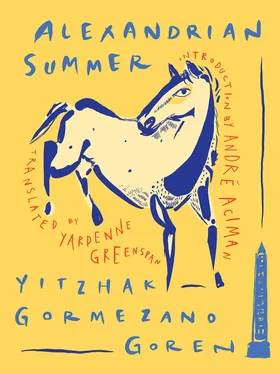Yusef Hamdi-Ali’s father was a clerk at the courthouse in Izmir. He made his living writing letters of appeal to the court for the illiterate. Sometimes he wrote love letters for them in decorative handwriting. Sometimes he would amuse himself by embellishing people’s letters with complex and ravishing arabesques. Yusef remembered the legendary creatures his father would conjure up so easily on yellowing paper. In his few free hours he would read and interpret to his son the mysterious contents of these compositions, which contained the essence and life of Islam.
Why was he remembering these calligraphic acrobatics of the virtuoso scribe now, of all times? For a moment he dozed off and saw himself trapped in the curlicues of one such arabesque, trying to free himself of the thicket of letters.
The dream was short, a blink of an eye, perhaps no time at all, perhaps eternity. Outside the window, an unreal sky winked at him. Joseph’s eyes were wide open, and a serenity he’d never experienced before descended upon him.
Leila strode slowly and sensually among fields and clouds, and Yusef settled on her bare back and was carried away on the wings of a dream.
Once, long ago when Joseph Hamdi-Ali was young and Leila enjoyed fame, the jockey and his mare were invited to race against the best jockeys and horses in Europe, at the Royal Ascot race in Berkshire, England. King George himself was to grace the event held each June with his royal presence. All of Britain prayed for mild weather, for in this faraway, northern land, it rained even in summer.
During the ten-day journey by ship to the British Isles, Leila was already restless. Joseph hired a special veterinarian to escort them. Those days, Joseph was rich and famous, and though he was never handsome, he had a seductive Eastern allure. Many women were prepared to join him in bed, especially on those long days of sea and sky. But he turned them all down with glum zealotry and remained faithful to his Emilie, and to his Leila. The veterinarian saw nothing out of the ordinary and reassured Joseph, jokingly telling him that a mare taken from her habitat would have a natural tendency toward depression, just as can occur in the best human families, and that Joseph had nothing to worry about.
Some time later, Joseph recalled those days of bright sun and flickering water, those days spent deep in the darkness of Leila’s special cabin, wondering what made her spirits so low and what was preventing her from eating. When he remembered all this, he knew for certain that Leila already foresaw what was in store for her in that foreign land of heavy clouds, and was sending him a silent warning, but he took no notice, purposely ignoring her desperate cry for help. He would not give up the promise of fame and fortune.
He, Joseph, left his homeland in his youth, turning his back on tradition, and went in search of greener pastures. He wandered across land and sea, never feeling that dull pain at the spot where his roots were torn from the ground.
But his mare did. Quick, easy, vulgar adaptation is not the way of nobility. Several years earlier, when she was uprooted from the great desert landscape and trapped among the fences of the giant tracks at the Gezira Sporting Club in Cairo, it took her weeks and months before she agreed to make do with an enclosed space, even though the tracks were so big that from certain angles the fence was nowhere to be seen. Joseph knew that when Leila felt stifled she stared longingly at the horizon of yellow desert dunes, encompassing endless space. At first Leila was rebellious and melancholic, and indifferent at best. Joseph was desperate. He’d spent his savings on her, hoping to rebuild a fortune off her, and had been bitterly disappointed. He often asked himself why he’d been tempted to purchase her at all. He even entertained the thought of selling her, despite the financial loss. But then, one bright morning, without any warning, she grew wings and spread them with nobility and grace, and overwhelming power.
Now Joseph sat at her side in the gloomy cabin of the ship and told himself, She’ll pull through … she’ll pull through …
The weather in Ascot was gray and dreary. Tiny drops of rain floated like dust through the heavy, hot air. Jockey and mare were somber, their heads hanging low. Yusef didn’t cheer up even when his promised payment was received. He and his mare were exiles. On the decisive day the grassy tracks were slippery and treacherous. Joseph expected the race to be cancelled or postponed due to the weather, but when black umbrellas began popping up like mushrooms, he realized that Europeans did not change their plans due to a drizzle. The race would be held as planned.
Did she slip on the muddy ground, losing her footing? Did she trip, taking an incautious step?
Everyone knows what happened next. Leila died in that foreign, unforgiving land. Leila died and the rain fell harder and harder and the ladies and gentlemen of Ascot fled from the storm. Leila was dead and no shipping company agreed to transport the carcass of a mare all the way to Egypt. Joseph was forced to leave Leila behind, and return to Alexandria alone.
This happened long ago, and one might assume it had been forgotten. After all, she was only a mare.
The illness lasted three days and three nights.
His leaving the house suddenly on the morning of the race made everyone suspicious and restless. Why did Joseph Hamdi-Ali choose to leave the house that morning, of all times? For three days he had laid in bed as if in another world, cavorting with angels, as if everyday matters were beyond him, the smile of death hovering over his face, and now suddenly he’d jumped out of bed, put on a clean, ironed shirt, a short jacket, his fez, and left with haste. Not just for a stroll, people would say after the fact. It was the exit of a determined man.
“He was seen walking into the pharmacy on the corner,” Madame Marika would say decisively.
General protest: Seen by whom? God save us from gossip! Que Dieu nous protège des mauvaises langues!
“I heard it from my Vita,” Madame Marika said to absolve herself of responsibility for her accusatory statement.
“And who did your Vita hear it from?” several voices asked at once. Some believed and wanted to know how Vita found out, certain that neither Vita nor Renée Marika invented the story. Others saw the entire tale as irresponsible slander, and asked the question ironically. They weren’t expecting an answer, but rather a shrug. But a woman like Marika was not one to give in to pressure. She quickly quipped, “From his sister, from Victoria herself.”
“And Victoria — where from?”
“Yes, Victoria, who did she hear it from?”
“Did she see Joseph?”
“Was she what you’d call an eyewitness?”
“Or did she hear it from someone else as well?”
“Why don’t you go and ask her yourselves!”
Someone made the effort to go to the Sporting neighborhood and ask Victoria herself. It turned out that her servant, Gamila, had seen a short, skinny man in a fez walking into the pharmacy.
“And is Joseph Hamdi-Ali the only short, skinny man who wears a fez in all of Alexandria?”
They interrogated the boy who worked at the pharmacy, a bespectacled Syrian whose French was vraiment impeccable . He answered the female contingent with perfect manners, but they couldn’t glean much from his words. In his generosity and graciousness he might have even tried to agree with those who claimed that Joseph wasn’t at the pharmacy that morning, as well as with those who claimed he was. Upon leaving, the ladies could agree only on one thing — the man was certainly charmant , but none of them could say he gave a clear answer.
Читать дальше












